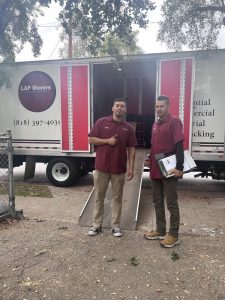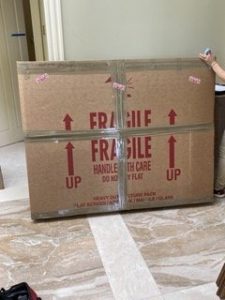How to Choose an Office Mover in Los Angeles

Moving an office isn’t just about packing up desks and computers. Whether it’s relocating a small startup or a corporate headquarters, every move comes with its own set of challenges. The size of the office, the distance to the new location, and the type of equipment involved all play a role in choosing the right mover.
Los Angeles presents unique complications. Heavy traffic, complex building regulations, and tight schedules can make the process even trickier. Some office buildings have strict moving hours, while others require special permits. Choosing a mover who knows the ins and outs of LA’s logistics can save time and prevent unexpected delays.
Not all moving companies are equipped to handle every type of office move. Some specialize in small businesses, while others cater to large corporations. Identifying your business’s needs—whether it’s handling delicate electronics or moving heavy furniture—ensures you choose a company with the right expertise. The better the fit, the smoother the transition.
Office, Commercial, and Industrial Movers – What’s the Difference?
Not all moving companies handle the same type of relocations. Choosing the right specialists ensures your move goes smoothly.
- Office Movers: These companies focus on relocating standard office spaces. They handle furniture, workstations, IT equipment, and documents, ensuring minimal downtime.
- Commercial Movers: A broader category that includes office movers but also covers retail stores, medical offices, and other business spaces. They often deal with fragile equipment and customer-facing setups.
- Industrial Movers: Specialize in relocating factories, warehouses, and heavy machinery. They require expertise in handling large-scale logistics, disassembly, and heavy equipment transport.
What’s Typically Included in an Office Move?
A professional office moving service provides more than just transportation. Understanding these services helps set clear expectations.
- Packing and Labeling: Movers can pack everything from office supplies to IT equipment and furniture, ensuring items are properly labeled for easy setup in the new location.
- Furniture Disassembly and Reassembly: Many office movers disassemble desks, cubicles, and conference tables, then reassemble them at the destination.
- IT Equipment Handling: Specialized movers disconnect, transport, and set up computers, servers, and office networks, minimizing technical disruptions.
- Storage Solutions: Some companies offer short- or long-term storage if your new office space isn’t ready immediately.
Not all moving companies include every service by default. Before hiring, confirm what’s included and ask about additional options tailored to your business needs.
Evaluating the Reputation and Qualifications of Los Angeles Office Movers
Where to Find Reliable Reviews and Customer Testimonials

Once you’ve figured out what you’re looking for, it’s time to look for service providers. Reviews and testimonials from previous customers are a great way to get an accurate insight into service quality. However, not all reviews are trustworthy, so knowing where to look makes a huge difference.
“Find customer reviews on third-party sites like Yelp and Google Reviews instead of just reading the customer reviews that companies share on their websites; those are always cherry-picked and don’t fully reflect actual customer experiences,” advises Move.org. Stick to platforms that verify customer feedback and provide a balanced view:
- Google Reviews: This is one of the easiest places to start. Pay attention to companies with a large number of reviews rather than just a high average rating.
- Yelp: Offers detailed customer experiences, but be wary of businesses that only have perfect 5-star reviews—those can sometimes be filtered.
- Better Business Bureau (BBB): This shows complaint history, accreditation status, and how the company responds to customer concerns.
- Trustpilot: Another solid review platform known for verified customer feedback.
- Company Website: Many movers list testimonials, but check if they align with third-party reviews. If every review is overwhelmingly positive, they may be curated.
- Social Media: Facebook and LinkedIn pages often have recommendations and customer comments that provide unfiltered insights.
Understanding Ratings and What They Say About Movers’ Service Quality
Numbers tell part of the story, but reading the details matters. Here’s what to focus on:
- 4.0 stars and above: Generally, a good indicator of reliable service, but read both positive and negative reviews to catch common themes.
- Consistency: A company with consistent ratings over time is a safer bet than one with sudden spikes or drops.
- Response to complaints: A professional office mover will respond to negative feedback with solutions, not defensiveness.
- Detailed reviews: The best customer feedback includes descriptions of the moving process, communication, and problem resolution.
Experience with Similar Office Moves in the Local Area
Not all moving companies specialize in office relocations, and experience matters, especially in a city like Los Angeles. Ask these questions:
- Have they handled office moves of comparable size? Moving a small startup is different from relocating a corporate headquarters.
- Are they familiar with your building’s regulations? Some LA office buildings have strict moving schedules, loading dock access rules, and elevator reservations.
- Do they have experience navigating LA’s traffic and logistics? Timely delivery isn’t just about packing skills—it’s about planning routes and avoiding peak congestion times.
Look for a company that doesn’t just move offices but moves offices in Los Angeles successfully.
Considering Insurance and Valuation Coverage
Moving an office comes with risks—damaged equipment, lost files, or unexpected delays. A reliable mover should have solid insurance and liability coverage to protect your business. But not all policies are the same. Understanding your options ensures you get the right protection.

Types of Insurance and Liability Coverage
Office moving companies offer different levels of coverage. Here’s what to look for:
- Released Value Protection: The most basic option, included at no extra cost. However, it only covers up to $0.60 per pound per item, which might not be enough for high-value office equipment.
- Full Value Protection: A more comprehensive policy that requires movers to repair, replace, or reimburse the full market value of any damaged items. It costs more but offers better protection.
- Third-Party Insurance: Some businesses opt for additional coverage from a third-party insurer, especially if moving high-value assets like specialized equipment or sensitive documents.
- Workers’ Compensation Coverage: This ensures that any injuries to the moving crew on your property don’t lead to liability issues for your company.
- General Liability Insurance: This covers damage to office property or the building during the move.
California Regulations on Moving
Office movers in California must meet state and federal regulations to operate legally. Key credentials include:
- California Public Utilities Commission (CPUC) License: Any company offering moving services within California needs a license from the CPUC. Licensed movers get a unique California T-number (e.g., “CAL-T XXXX”).
- U.S. Department of Transportation (USDOT) Number: If a company handles interstate moves, it must be registered with the Federal Motor Carrier Safety Administration (FMCSA) and have a valid USDOT number.
- Motor Carrier (MC) Number: Movers involved in interstate transport also need an MC number issued by FMCSA.
- Workers’ Compensation Insurance: A licensed moving company must carry workers’ comp insurance for its employees, protecting you from liability in case of injuries during the move.
According to the Federal Motor Carrier Safety Administration (FMCSA), “Companies that operate commercial vehicles transporting passengers or hauling cargo in interstate commerce must be registered with the FMCSA and must have a USDOT Number.”
In California, office movers must also be licensed by the Bureau of Household Goods and Services (BHGS). They are required to offer at least Released Value Protection, but businesses moving offices should consider adding Full Value Protection or third-party coverage for better security. The BHGS regulates claims procedures in case of loss or damage. Movers must provide a written estimate detailing insurance options and their limitations.
Questions to Ask Movers About Their Coverage
Before signing a contract, get clarity on the mover’s insurance policies. Here are key questions to ask:
- What types of coverage do you offer? Ensure they provide more than just the minimum Released Value Protection.
- What happens if equipment gets damaged? Find out how claims are processed and how long reimbursements take.
- Does your coverage include loss due to negligence or delays? Some policies only cover direct damage, not indirect losses.
- Are there exclusions? Some policies won’t cover specific items like electronics or perishable goods.
- Is Workers’ Compensation included? This is essential to avoid liability if a mover gets injured on your property.
- Can I review a certificate of insurance? Ask for a copy to confirm coverage details and verify authenticity.
Understanding insurance coverage before hiring a mover prevents costly surprises. Taking the time to clarify policies ensures your office move goes smoothly, even if things don’t go as planned.
How to Verify a Mover’s Credentials
Don’t just take a moving company’s word for it—verify everything yourself. Here’s how:
- Check the CPUC License: Visit the California Public Utilities Commission website and search for the company’s CAL-T number.
- Confirm DOT and MC Numbers: Go to the FMCSA website and enter the company’s USDOT or MC number to check its registration status.
- Verify Insurance Coverage: Ask for a certificate of insurance (COI) and call the provider to make sure the policy is active.
- Look for Memberships in Professional Associations: Some reputable movers are members of organizations like the American Moving & Storage Association (AMSA), the California Moving and Storage Association (CMSA), or the Better Business Bureau (BBB), which can provide additional credibility.
Inquiring About Additional Services
Office moves aren’t just about transporting desks and chairs. Many moving companies in Los Angeles offer add-on services like packing, storage, and setup. These extras can save time and reduce strain on employees, but are they worth the cost?
Cost-Benefit Analysis of Add-On Services

Extra services come with extra costs, so weigh the benefits before committing.
- Time Savings: Professional movers handle packing and unpacking faster than employees, keeping workflow interruptions to a minimum.
- Reduced Risk: Movers use the right materials and techniques to protect expensive office furniture, electronics, and documents.
- Labor Efficiency: Employees can focus on their actual work instead of spending hours packing, labeling, and lifting boxes.
- Cost vs. DIY: Hiring professionals may seem more expensive upfront, but avoiding damage, lost productivity, and potential injuries can offset these costs.
The Impact of Professional Packing and Setup
Poor packing leads to damaged goods and a chaotic workspace after the move. Movers offering full packing and setup services take care of the following:
- Custom Packing Solutions: They bring the right materials to protect delicate or high-value items, including computers, servers, and office decor.
- Labeling and Inventory: A well-organized packing system speeds up unpacking and minimizes misplaced items.
- Ergonomic Setup: Movers arrange desks, conference rooms, and workstations based on your office plan so employees can get back to work quickly.
Long-Term Storage Solutions for Los Angeles Businesses
If you’re downsizing, moving temporarily, or renovating, storage can be a game-changer.
- Short-Term and Long-Term Options: Some moving companies offer climate-controlled facilities for sensitive items like paperwork or tech equipment.
- Security Features: Ask about surveillance, restricted access, and insurance coverage to protect stored assets.
- Flexible Access: Some services allow easy retrieval of stored items when needed, preventing logistical bottlenecks.
Schedule Flexibility for Minimized Downtime
When moving offices, hiring movers with flexible scheduling is key to ensuring that business continues to operate as smoothly as possible. This means after-hours and weekend availability for an uninterrupted workday and adherence to building regulations that may not allow moving during business hours.
Before choosing an office mover, check which additional services they provide and whether they align with your business’s needs. In some cases, these services make the move smoother, faster, and more efficient.
Analyzing the Cost and Value of Office Moving Services
Understanding Different Types of Estimates

Not all moving quotes are the same. Ask movers what kind of estimate they provide to avoid surprise charges.
- Non-Binding Estimate: The final cost may go up if the actual move requires more time or labor than expected.
- Binding Estimate: The price is locked in as long as the scope of the move doesn’t change.
- Binding-Not-To-Exceed Estimate: The maximum cost is set, but if the move takes less time or effort, you pay less.
For office moves, a binding-not-to-exceed estimate offers the best balance of cost protection and flexibility. It prevents surprises while allowing for potential savings.
How to Compare Quotes and Understand Cost Breakdowns
“Start the search for a moving company as soon as possible—preferably two months before your move—to get the best price,” recommends the New York Times. Movers price their services based on several factors, and understanding the breakdown will help you make an informed choice. When comparing quotes, pay attention to the following:
- Labor Costs: Charges for movers’ time, usually billed hourly or as a flat rate.
- Transportation Fees: Fuel, mileage, and truck rental costs.
- Packing Services: Costs of materials and labor if the company provides packing.
- Equipment Fees: Additional charges for moving large items like desks, servers, or safes.
- Disassembly and Reassembly: Some movers charge extra for taking apart and setting up furniture.
- Storage Costs: If there’s a gap between move-out and move-in dates, storage fees may apply.
- Insurance Coverage: Different levels of insurance may be included or offered as an add-on.
Request a detailed, itemized quote from each company. If a quote seems unusually low, double-check what’s included to avoid unexpected charges later.
The Relationship Between Cost, Quality, and Value
Choosing the cheapest option can backfire if it leads to delays, damaged equipment, or lost productivity. Instead of focusing purely on cost, consider overall value. A higher price may reflect:
- Experienced Movers: Skilled teams work efficiently, reducing downtime.
- Better Equipment: Professional tools and trucks ensure a safer move.
- Insurance and Liability Coverage: Protects your company’s assets in case of damage or loss.
- Additional Services: Some companies handle IT relocation, specialized packing, or setup.
A well-organized move saves time and preserves productivity, which can outweigh the cost difference between a budget and a premium service.
Hidden Costs to Watch for in Moving Contracts
Some moving companies advertise low upfront rates but add fees later. Check the contract carefully for hidden costs such as:
- Long Carry Fees: If the moving truck parks far from the office entrance.
- Stair or Elevator Charges: Extra fees for moving heavy items without a loading dock.
- Peak Time Pricing: Higher rates for weekend or end-of-month moves.
- Extra Hours: Some movers charge overtime beyond a set number of hours.
- Special Handling: Items like artwork, electronics, or safes may incur additional charges.
- Delay Fees: If your team isn’t ready when movers arrive, waiting time may cost extra.
Ask for a firm estimate and inquire about potential extra costs. A reputable company will be upfront about all charges so that you won’t encounter surprises on moving day.




